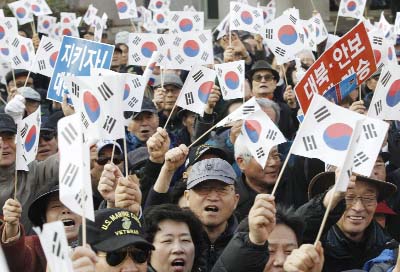
AP, Seoul :
South Korea’s parliament on Thursday passed a law that would allow a special prosecutor to investigate a corruption scandal threatening the presidency of Park Geun-hye.
The opposition-controlled National Assembly also voted for a parliamentary investigation into allegations that Park allowed a secretive confidante to manipulate power from the shadows and amass an illicit fortune.
The bill on an independent investigation was passed by a vote of 196 to 10 with 14 abstentions in the 300-seat assembly. It came as state prosecutors prepared to indict Park’s friend by Sunday. Prosecutors had sought to question Park this week, but her lawyer on Thursday asked for more time. “I will do my best to prepare my arguments as quickly as I can and cooperate so that the investigation of the president can happen next week,” Yoo Yeong-ha, Park’s lawyer, said in a statement.
An independent investigation would increase the pressure on Park, who has been facing growing calls by opposition lawmakers to resign. Although emboldened by a wave of massive protests, opposition parties have yet to seriously push for Park’s impeachment over fears of triggering a backlash from conservative voters and negatively impacting next year’s presidential election.
Park has 15 days to sign off on the law or use her constitutional right to reject it, although that’s considered unlikely.
Park has apologized for letting her friend Choi Soon-sil, the daughter of a late cult leader who emerged as Park’s mentor in the 1970s, edit some of her draft speeches and for the public anger caused by the scandal. But she has not commented on the most damning accusations that she let Choi manipulate important government decisions on policy and personnel. Under South Korea’s Constitution, the president has immunity from prosecution except in cases of treason, but she can be investigated. The law passed on Thursday requires Park to select a special prosecutor among two candidates proposed by opposition parties to lead an investigation that would obviously be aimed at exposing her own wrongdoings.
The special prosecutor can form a team of 60, including up to 20 state prosecutors, and will have 90 days to investigate and determine whether to pursue charges. The investigation period can be extended to 120 days, but only if Park approves. Opposition lawmakers have pushed for an independent investigation into the scandal over concerns that state prosecutors’ close ties with presidential officials might inject bias into their probe.
South Korea’s parliament on Thursday passed a law that would allow a special prosecutor to investigate a corruption scandal threatening the presidency of Park Geun-hye.
The opposition-controlled National Assembly also voted for a parliamentary investigation into allegations that Park allowed a secretive confidante to manipulate power from the shadows and amass an illicit fortune.
The bill on an independent investigation was passed by a vote of 196 to 10 with 14 abstentions in the 300-seat assembly. It came as state prosecutors prepared to indict Park’s friend by Sunday. Prosecutors had sought to question Park this week, but her lawyer on Thursday asked for more time. “I will do my best to prepare my arguments as quickly as I can and cooperate so that the investigation of the president can happen next week,” Yoo Yeong-ha, Park’s lawyer, said in a statement.
An independent investigation would increase the pressure on Park, who has been facing growing calls by opposition lawmakers to resign. Although emboldened by a wave of massive protests, opposition parties have yet to seriously push for Park’s impeachment over fears of triggering a backlash from conservative voters and negatively impacting next year’s presidential election.
Park has 15 days to sign off on the law or use her constitutional right to reject it, although that’s considered unlikely.
Park has apologized for letting her friend Choi Soon-sil, the daughter of a late cult leader who emerged as Park’s mentor in the 1970s, edit some of her draft speeches and for the public anger caused by the scandal. But she has not commented on the most damning accusations that she let Choi manipulate important government decisions on policy and personnel. Under South Korea’s Constitution, the president has immunity from prosecution except in cases of treason, but she can be investigated. The law passed on Thursday requires Park to select a special prosecutor among two candidates proposed by opposition parties to lead an investigation that would obviously be aimed at exposing her own wrongdoings.
The special prosecutor can form a team of 60, including up to 20 state prosecutors, and will have 90 days to investigate and determine whether to pursue charges. The investigation period can be extended to 120 days, but only if Park approves. Opposition lawmakers have pushed for an independent investigation into the scandal over concerns that state prosecutors’ close ties with presidential officials might inject bias into their probe.

